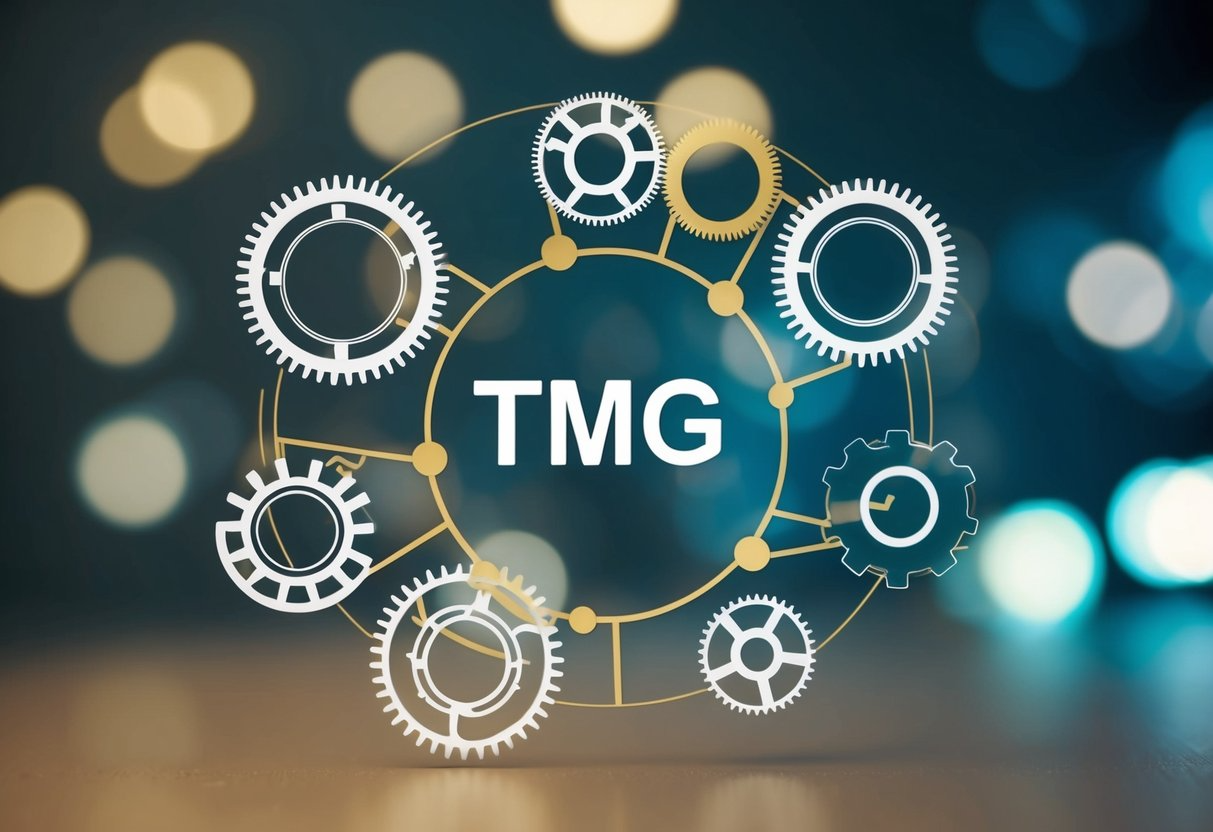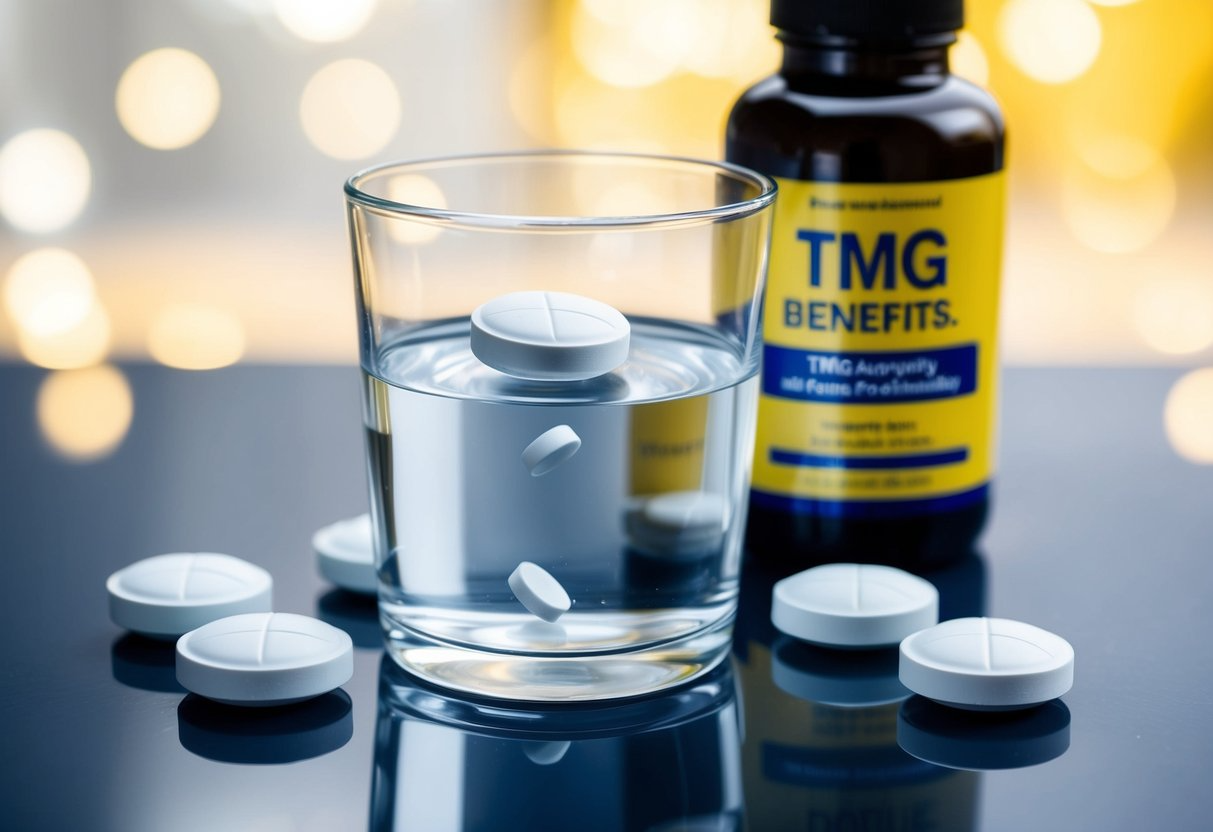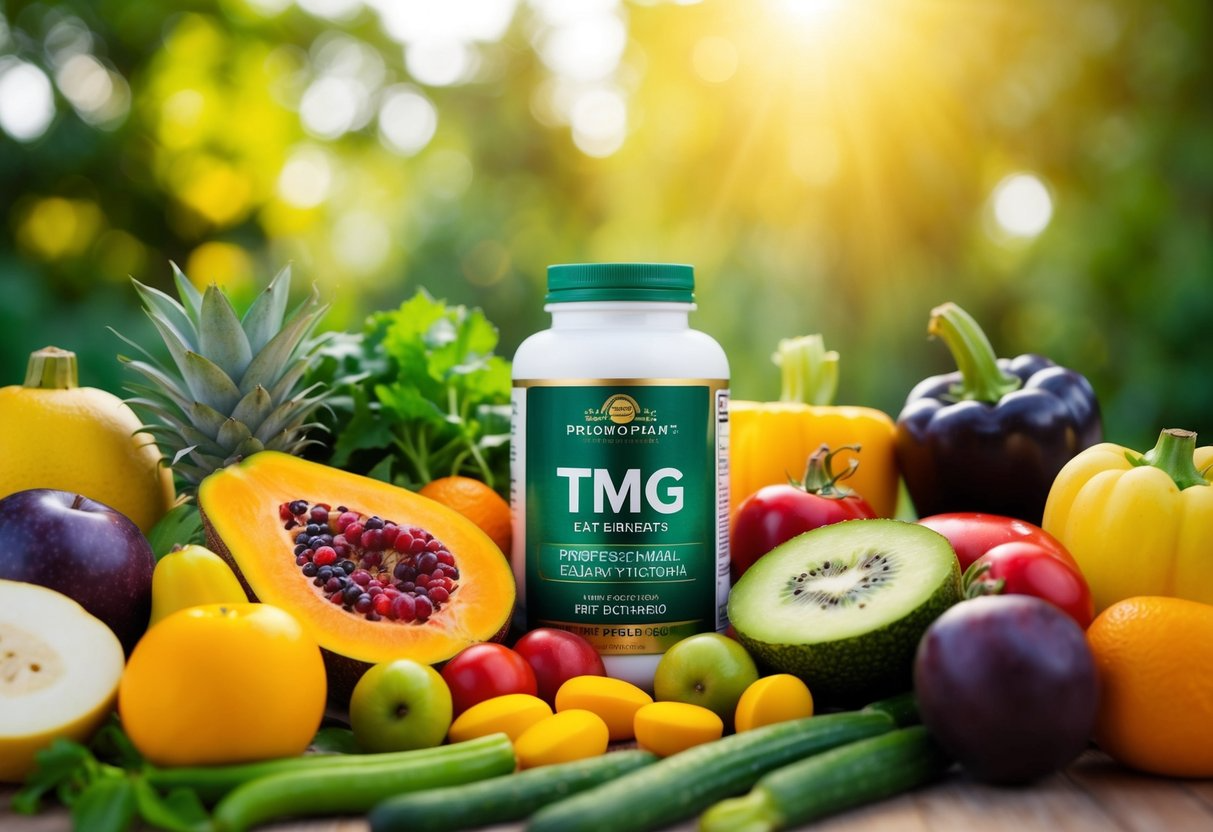Meet TMG, a cousin of the B vitamin family that’s been gaining attention for its slew of potential health perks. Beet and other foods are loaded with a nutrient that’s making waves for its part in many bodily functions.
TMG may help lower homocysteine levels. A healthy heart beats stronger when homocysteine levels are under control. It’s a vital piece of the overall well-being puzzle, and one you shouldn’t overlook.
TMG works by supporting methylation processes in the body. Affecting multiple facets of our health, this critical function goes to work on the molecular level, setting the stage for DNA repair and the manufacture of vital neurotransmitters.
Some folks supplement with TMG to gain a competitive edge, brighten their mood, and keep their liver running smoothly.
Don’t just jump into TMG without knowing what you’re getting into – take the time to learn about its effects and proper application. A small adjustment in timing or dosage can mean the difference between success and disappointment.
As with any supplement, it’s wise to consult a healthcare professional before adding TMG to your routine.
The Cliff Notes
- With TMG on your side, you can expect significant backing for your methylation needs, every step of the way. Bring homocysteine levels down a peg. Physically, humans operate with remarkable systems humming in harmony inside them. Cell by cell, organ by organ, everything works together seamlessly, permitting our complex bodies to function normally.
- Get ready to benefit from improved cardiovascular well-being, high-performance athletics, and a brightened mood, all thanks to this compound.
- Critical to getting the most out of TMG supplementation is knowing how much to take and having a pro to guide you.
We’re eager to introduce you to TMG – a force that’s driven by a shared vision and propelled by collective energy.

Across the body, TMG pulls double duty, its influence felt far and wide. In order to keep your body’s vital processes humming along, you can turn to food or supplements for a helping hand – and this essential element is the key.
Let’s talk about Trimethylglycine – a compound that’s definitely worth getting to know.
Trimethylglycine (TMG), also known as betaine, is a naturally occurring compound in the body. It’s made up of three methyl groups attached to glycine, an amino acid. TMG is the team player that keeps several bodily functions running smoothly.
The main job of TMG is to donate methyl groups. What’s really happening here is that crucial molecules are being formed, and liver function gets a much-needed hand. Cellular hydration is precarious, but TMG lends a steady hand, maintaining the precise balance of water and solutes within cells.
In its supplement form, you’ll often find TMG being used to support a better heart health. Taken to the next level, athletes who crush their goals do so with one major advantage: streamlined physiology. Foster a healthy heart by getting the support it needs. Elevated homocysteine levels have been linked to heart disease, but the flip side is that lowering them might just do your heart some good.
TMG plays a starring role in methylation, where it jumpstarts a chain reaction of vital cellular functions.
In the grand scheme of bodily functions, methylation takes center stage. Imagine molecules with methyl groups attached – the outcome is a series of transformations in how your body works. Whether you’re looking for guidance or a reliable partner, TMG is the one you can count on to get the job done.
TMG donates methyl groups to homocysteine, turning it into methionine. Homocysteine levels are reined in thanks to this vital function.
Blame high homocysteine levels for potentially putting your heart at risk; it can damage vessels and increase the likelihood of heart disease.
The methylation process also helps create:
- DNA
- RNA
- Proteins
- Neurotransmitters
By supporting methylation, TMG helps maintain cell health, gene expression, and proper nervous system function. It also aids in creating S-adenosylmethionine (SAM), a powerful antioxidant.
Dietary Sources of TMG
TMG can be found in various foods. Including these in your diet can help boost your TMG intake naturally.
Top food sources of TMG include:
- Quinoa
- Spinach
- Beets
- Wheat bran
- Shellfish
Beets are especially rich in TMG. They’re the source of the name “betaine,” as TMG was first isolated from sugar beets. Whole grains like quinoa and amaranth also provide good amounts of TMG.
For those who don’t get enough TMG from food, supplements are available. These often come in powder or capsule form.
Remember to talk to a doctor before starting any new supplement regimen.
Health Benefits of TMG

TMG offers several potential health advantages. Whether you’re looking to support your heart, liver, or brain, or simply want to perform at your best physically, this supplement may be just what you need.
Cardiovascular Health
TMG helps lower homocysteine levels in the blood. Heart health alarms sound when homocysteine levels get too high. The numbers don’t lie: scientific findings show us that. As part of a balanced approach, TMG could play a role in defending against cardiovascular disease, giving you a fighting chance at a healthier tomorrow.
Add maintaining healthy cholesterol levels to the list of benefits – a habit that can significantly improve overall health. TMG may increase “good” HDL cholesterol while lowering “bad” LDL cholesterol.
Healthy blood pressure levels are within reach, thanks to theCompound’s regulating properties. Blood vessels and the heart itself get fortified, reducing the likelihood of heart-related problems down the line.
Liver Function and Detoxification
TMG plays a key role in liver health. This all-important function prevents the liver from getting clogged with excess fat.
The payoff could be huge: a reduced risk of non-alcoholic fatty liver disease. TMG supports the liver’s detox functions.
Picture this: a superefficient system that pulverizes harmful substances, leaving our bodies more vibrant and free. This keeps the liver working well.
As part of its overall health-boosting efforts, TMG aids in the creation of bile. Bile is the digestive system’s Drano – without it, your body would get clogged up with toxic substances.
Cognitive Function and Mental Well-Being
TMG may boost brain function. This powerhouse helps stimulate the production of vital neurotransmitters that keep our minds firing on all cylinders.
Mood, memory, and focus are all interconnected and heavily influenced by the chemical cocktail swirling in our brains. TMG supports the production of S-adenosyl methionine (SAM-e).
SAM-e is linked to improved mood and cognitive function. Investigators have uncovered some telling clues that point to a relationship between this cause and that effect. Depression and anxiety can be relentless, but research suggests that TMG could be a valuable ally in the fight for emotional wellness.
Brain cells get an extra safeguard against damage with this powerful protectant. Slow down mental decline, and give yourself a fighting chance against age-related mind fade.
Physical Performance and Body Composition
TMG may enhance athletic performance. Boosting creatine levels from the inside out, it essentially jumpstarts the body’s natural production.
When you crank up your workout, creatine kicks in to amplify your strength and power. TMG joins the fray, taking some of the weight off your shoulders. There’s a crucial phase of fitness that gets far too little love: rebuilding and restoring your muscles after a intense workout. After pumping iron, you want to follow up with the right rituals.
Building muscle and losing fat – that’s the promising outcome of this approach. Cells get a much-needed energy boost when TMG is on the job.
Physical activities become less exhausting when you can push through longer. Fatigue after exercise can be significantly lessened.
Healthy Aging and Longevity
TMG supports healthy aging in several ways. The impact of oxidative stress is greatly softened when cells have this added defense mechanism in place.
This may slow down the aging process at a cellular level. The delicate balance of gene expression depends on DNA methylation, and TMG is the architect that makes it all possible.
To truly age gracefully, our genes must be firing on all cylinders, producing a harmonious synergy that staves off disease and decay. Mitochondrial function gets a boost with TMG’s support.
Looking deeper, you’ll find a cell’s inner gears turning thanks to the remarkable output of its miniature power plants – the mighty mitochondria. One factor that separates the young from the old? The condition of our mitochondria, which just so happens to be closely tied to how long we live.
Imagine living a life where age-related diseases aren’t holding you back. That’s what TMG is working towards – a healthier, happier you. This helps keep your cells running smoothly and performing at their best.
Mechanisms of Action

TMG, or trimethylglycine, plays a key role in several biological processes. It’s a triple threat, optimizing homocysteine levels, rewriting genetic blueprints, and fortifying cells against oxidative stress – a formidable defense against cellular chaos.
Homocysteine Metabolism
TMG acts as a methyl donor in the body. Methionine production gets a boost when it steps in to reclaim homocysteine molecules. Homocysteine levels stay healthy thanks to this process.
Elevated homocysteine is now recognized as a crucial indicator of underlying health problems waiting to surface. TMG’s ability to lower homocysteine may reduce these risks.
Cycling through methylation efficiently fuels our cells’ reproductive machinery. A multitude of bodily processes actually revolve around this singular factor. TMG jumps into the cycle, preserving your overall well-being.
Genetic Expression and Protein Production
TMG’s role in methylation extends to DNA and protein production. Stable and balanced, it keeps everything on an even keel. Cellular activities are dictated by something remarkable: the interplay between genes and their environment, orchestrating an intricate ballet of biochemical reactions. Silencing genes through a vital process called DNA methylation lies at the heart of what makes us who we are.
Genes can be flipped on or off through this process, controlling the production of specific proteins. Proper methylation is key for normal cell function and growth.
Carnitine and creatine, essential molecular pillars, rely on TMG’s supporting role to thrive, and their importance can’t be overstated. Energy production and muscle function rely on these factors.
Antioxidant Properties and Cellular Health
TMG shows antioxidant properties, protecting cells from oxidative stress. Free radicals don’t stand a chance against this effective neutralizer, which safely disarms them.
As free radicals get neutralized, cellular well-being gets a much-needed boost. Safeguarding your cells’ vital components, it shields DNA, proteins, and cell membranes from harm.
Add DNA repair to the list of TMG’s capabilities – it’s an added bonus to an already impressive arsenal of health benefits. Cell function thrives when genetic material is protected and maintained – this is exactly what this process accomplishes.
When TMG gets to work, cells get a fitness boost, with oxidative damage dwindling and methylation mileage increasing – the perfect combo for top-tier cellular performance.
Nutritional Synergy
TMG works together with other nutrients to boost health benefits. This pairing with vitamins can also get a boost from the food we eat.
Interaction With Vitamins and Other Nutrients
TMG pairs well with B vitamins for better health effects. It works with vitamin B12 and folate to lower homocysteine levels in the body. When we work together, your heart health gets a protective shield.
TMG also supports vitamin B6 in making important brain chemicals. Side by side, they collaborate to achieve a common goal. Uplift your emotions and shake off the blues by incorporating activities that bring you happiness. Alongside thoughts and feelings, brain function plays a vital role.
S-adenosylmethionine (SAM-e) is another key player. TMG helps make SAM-e in the body. Liver health and joint comfort receive a welcome boost from this potent partnership.
Enhancing the Benefits Through Diet
Eating the right foods can boost TMG’s effects. Beets, spinach, and whole grains are good sources of TMG.
Adding these foods to your diet can increase your TMG intake naturally. This can work well with TMG supplements.
Protein-rich foods like fish and eggs also help. TMG gets a serious boost when these nutrients are in the mix, leading to dramatic improvements.
Fuel your body with a diet packed with colorful fruits and crisp veggies. It gives your body the tools it needs to use TMG well.
Supplementation

TMG supplements offer potential health benefits, but proper selection and usage are crucial. Pick the right product, follow the dosing instructions to the letter, and stay vigilant about potential side effects – it’s the best way to reap the benefits while sidestepping the risks.
Choosing a TMG Supplement
When selecting a TMG supplement, quality and purity are key factors. Look for products labeled as betaine anhydrous, which is the pure form of TMG. Reputable brands often provide third-party testing results to verify their products’ contents.
Some top-rated TMG supplements include:
- Genex: 1000mg per serving, 100% pure betaine anhydrous
- NexGen Blends: 500mg per serving, with added B-vitamins
- Puregen Labs: 750mg per serving, vegan-friendly capsules
Check for certifications from organizations like NSF International or USP to ensure product quality.
Dosage and Administration
TMG dosage can vary based on individual needs and health goals.
Common dosage recommendations range from 500mg to 3000mg per day, divided into 2-3 doses.
For heart health, take 1500-3000mg daily. For athletic performance, take 2000-2500mg daily. For general health, take 500-1000mg daily.
It’s best to take TMG with meals to improve absorption. Some people prefer taking it in the morning for energy, while others split doses throughout the day.
Always start with a lower dose and gradually increase as needed. Consult a healthcare provider before starting any new supplement regimen.
Potential Side Effects and Considerations
While TMG is generally well-tolerated, some people may experience side effects.
Common mild side effects include:
- Nausea
- Diarrhea
- Stomach discomfort
More serious considerations include:
- Increased cholesterol levels : TMG may raise LDL (bad) cholesterol in some individuals.
- Interactions with medications: TMG can interact with certain drugs, especially those affecting liver function.
People with liver or kidney problems should be cautious when using TMG. Pregnant or breastfeeding women should avoid TMG supplements due to limited safety data.
Monitor your body’s response when starting TMG supplementation. If you experience persistent side effects, stop use and consult a healthcare professional.
TMG and Specific Health Conditions

TMG has shown potential benefits for various health conditions. The scientific consensus is clear: this booster is closely tied to benefits for heart health, liver function, mental clarity, and even gains in athletic performance.
Heart Disease and Stroke Prevention
TMG plays a role in cardiovascular health. When homocysteine levels get too high in the blood, it can cause problems – but with this on your side, those levels decrease, promoting better health overall. Heart disease and stroke risk are palpable threats when homocysteine levels skyrocket.
Blood lipid profiles tend to look better when TMG is part of the picture, according to recent studies. It can lower total cholesterol and LDL (bad) cholesterol. At the same time, it may raise HDL (good) cholesterol.
TMG lends a helping hand to keep blood vessels in top shape. Get your blood moving and the risk of clots will dramatically decrease – that’s a protection worth fighting for.
For heart health, typical TMG doses range from 500-3000 mg per day. Always consult a doctor before starting any new supplement regimen.
Liver Diseases: NAFLD and NASH
TMG shows promise for liver health, especially with fatty liver conditions. It may help with non-alcoholic fatty liver disease (NAFLD) and non-alcoholic steatohepatitis (NASH).
This supplement helpsLiver fatty buildup melt away. As it gets to work, fat burning accelerates and inflammation calms, paving the way for real progress.
Studies in animals have shown TMG can:
- Decrease liver fat content
- Lower liver enzyme levels
- Reduce liver inflammation and damage
Human studies are still limited. Before we can be certain about TMG’s impact on NAFLD and NASH, more studies need to be conducted with human participants.
Mental Health Issues: Depression and Anxiety
TMG may have positive effects on mental health. It acts as a methyl donor in the body. Neurotransmitters that regulate our mood rely on this crucial process to get made.
Depression can be a debilitating condition, but scientists are exploring whether TMG might be able to offer some relief, potentially easing its crushing symptoms. It might work by:
- Increasing serotonin levels
- Reducing homocysteine (linked to depression)
- Supporting overall brain health
For anxiety, TMG’s effects are less clear. The need for further investigation is clear – we’re just scratching the surface here.
Keep in mind that TMG is not a replacement for professional mental health treatment. Always talk to a doctor or therapist about mental health concerns.
Metabolic Syndrome and Diabetes Management
TMG may help with metabolic health issues. Simple tweaks can boost its performance. Blood sugar regulation relies heavily on one key player: how well your body responds to insulin. and One major objective for diabetes management is to rein in those pesky blood sugar spikes – and fast. . People living with metabolic syndrome or diabetes might just find their silver bullet in this discovery.
Studies have shown TMG can:
- Lower fasting blood glucose levels
- Improve insulin resistance
- Help regulate lipid metabolism
These effects may reduce the risk of developing type 2 diabetes. Already dealing with diabetes? TMG could be just what you need to take control of your blood sugar management.
Liver health is a top priority for TMG, which steps in to offer essential backup. As it turns out, liver issues frequently crop up alongside metabolic syndrome – a Connection we’d do well to explore.
Muscle Endurance and Recovery
Athletes and fitness enthusiasts may benefit from TMG. Possibilities abound here – it’s got the goods. Kick your fitness goals into high gear by supercharging your body’s ability to perform at its best and bounce back from intense workouts. .
With TMG on your side, you can push through even the toughest workouts without hitting the wall too soon. It does this by:
- Reducing lactic acid buildup
- Improving oxygen use in muscles
- Supporting energy production in cells
For recovery, TMG can help reduce muscle damage and soreness after exercise. Faster muscle repair is also on the table.
High-intensity exercises get a whole lot easier with TMG on your side, scientists say, since it can seriously crank up your power output. This could mean a serious boost in athletic prowess, giving weekend warriors and pros alike an edge in their respective games.
Typical doses for athletic performance range from 2-4 grams per day. It’s only natural that results will differ – your body, your workout, and your own history all play a part in shaping the outcome.
As we push forward, our research opens doors to new possibilities. Here, we’ll highlight the directions we’re taking and the innovations we expect to see.

As researchers push the boundaries, they’re making groundbreaking discoveries that could change the face of health forever. Researchers are shaking the bushes to see how it can stave off diseases. Growing old with vitality and spirit is what it’s all about – staying energetic, curious, and full of life. .
Fresh research shines a light on TMG, uncovering surprising insights that are transforming our understanding.
Fresh research has shed promising light on TMG’s benefits across multiple health fronts.
Homocysteine levels can get out of hand, but TMG could be the natural booster your body needs to get them back in check. Cardiovascular disease risks take a hit, thanks to this welcomed outcome. With atherosclerosis research heating up, scientists are zeroing in on the homocysteine connection and what it might mean.
Researchers are exploring how TMG affects brainpower, getting to the bottom of its cognitive impact. The early buzz is inspiring – it’s possible that this discovery will lead to robust cognitive health well into our golden years. With autism spectrum disorders in their sights, scientists are investigating TMG’s potential – but more studies are required to uncover its true potential.
What happens when cells need energy? That’s where TMG’s role becomes really interesting. By influencing NAD+ pathways, we’re essentially giving our bodies a helping hand when it comes to growing old gracefully.
Potential Applications in Disease Prevention
TMG’s methyl-donating properties make it a subject of interest in cancer prevention research. One question on everyone’s mind is: what does this mean for DNA methylation, a biological process intricately connected to the onset of cancer?
With aging populations on the rise, TMG has emerged as a prime candidate to support whole-body wellness, and scientists are running with it. What happens when you factor it in? Researchers want to know.
- From filtering toxins to regulating hormones, our liver is a hard worker – but how can we give it the support it needs?
- You can’t talk about human movement without discussing muscle function – it’s the motor that drives every action, from walking to laughing.
- Our body’s fuel processing system – where the magic happens!
Research breakthroughs are stacking up, and the outlook is progressively optimistic. With TMG, we’re boldly pushing the boundaries of dietary science and healthcare. A closer look is being taken at how TMG interacts with other cellular supporters like NMN, with an eye towards enhancing overall health.
Frequently Asked Questions

TMG supplements offer potential health benefits and support for athletes. Users should be aware of proper dosages, possible side effects, and optimal ways to take TMG.
So, you’re considering TMG supplements – but what’s in it for you, exactly?
You could experience the benefits of TMG supplements that Take care of your ticker – do everything you can to promote healthy circulation and a robust cardiovascular system. Reducing the homocysteine buildup in your blood gets the ball rolling. Make this move and you’ll rest easier at night, knowing you’ve reduced your risk of developing serious heart conditions.
Detoxification is a full-time job, and TMG is the reliable sidekick your liver needs to get the task done efficiently. The liver cells get a shield from damage with this.
Studies point to TMG as a potential insulin regulator, offering hope to individuals struggling with diabetes and related conditions.
Can taking TMG supplements actually deliver the gains that athletes and bodybuilders are looking for in their muscle-building regimens?
We’re talking major potential with TMG, folks. Crank up your competitive edge. Exercise takes on a whole new level of challenge and reward when amplifying strength and power takes center stage. The end result? Potentially faster muscle growth and stronger athletic performance down the line.
Post-workout, the supplement might give athletes an extra edge, enabling them to tackle tough training sessions with renewed energy and vitality.
By combining proper training and nutrition, TMG can play a significant role in boosting muscle growth.
As you consider taking TMG supplements, have you wondered what kinds of side effects you might encounter?
Most people tolerate TMG supplements well, but some may experience mild side effects. A few potential side effects to keep an eye on include stomach queasiness, loose stools, or a generally unhappy belly.
In rare cases, TMG might cause headaches or dizziness. Experiencing these symptoms? Time to schedule a sit-down with a healthcare expert to tackle the problem head-on.
What is the recommended TMG dosage for adults?
The typical TMG dosage ranges from 500 mg to 3,000 mg per day. Some studies have used doses up to 15 grams daily without significant adverse effects.
It’s best to start with a lower dose and gradually increase it as needed. Always follow the instructions on the product label or consult a healthcare professional.
TMG supplements: can they really help bring blood pressure under control?
Blood pressure could be affected by TMG, but not directly – instead, it works its magic through a healthier cardiovascular system. One significant benefit of keeping homocysteine levels low is that it really helps blood vessels do their job properly.
But the direct effect of TMG on blood pressure remains an open question – more research is required to fill in the blanks. People with hypertension should consult their doctor before taking TMG supplements.
Is it more beneficial to take TMG supplements with food or on an empty stomach?
TMG supplements can be taken with or without food.
Some people prefer taking them with meals to minimize potential stomach discomfort.
Taking TMG on an empty stomach might lead to faster absorption. However, there’s no strong evidence suggesting one method is significantly better than the other.